Futures Forum: Brexit: and the future of rural services in the South-West
Futures Forum: Brexit: and rural development grants on hold
Futures Forum: Brexit: and Making the Case for Rural
The Guardian considers these issues as seen from Crediton:
'Walking into the unknown': rural England weighs up the reality of Brexit
The EU helped shape the UK landscape with both money and a swath of rules and directives. In places like Crediton, a picture-perfect corner of rural Devon, locals fear the change to come – but also smell opportunity
The landscape around Crediton in Devon is picture-postcard perfect – a patchwork of fields, thick hedges, woods, rolling hills with rivers, streams and deep lanes meandering through.
They have farmed the rich red soil here for centuries. Romano-British farms have been discovered and in the middle ages Crediton (the name comes from the river Creedy and the old English “tun” meaning farm) was a thriving wool town.
This mild, damp corner of England is a living, working landscape. Cattle, sheep and poultry are reared; there are well-stocked fishing rivers; good cider and cheese is produced; bees, goats, geese are nurtured. Scores of businesses, from the feed producers to the garages that fix farm vehicles, depend on farming and other rural concerns.
And it is part of one of the UK’s key rural economies. According to the National Farmers’ Union (NFU), the south-west’s farm businesses turn over £2.7bn, more than any other region in England. Agriculture directly employs 78,000 people, over a fifth of all those working in the sector in England. Many thousands more work in jobs that would not exist if farming and food production ceased.
Now with the Brexit vote, a question mark hangs over this world. Theresa May’s policy adviser suggested this week that some of the billions of pounds paid to British farmers today could be diverted to the NHS as the UK leaves the EU.
The EU has helped shape this landscape through the payments that farmers receive, the Brussels cash available for stewardship schemes and a swath of regulations, directives, rules. Crediton is a good place to explore what the EU has done for the British countryside, how Brexit may change it and what the hopes and fears of those living here are.
The family farmer
Jilly Greed is a fourth generation farmer. Her son, George, is the fifth. Greed describes Fortescue Farm as “progressive” – they are always seeking out ways of improving the land and business, making sure their beef cattle are healthy, finding ways of increasing their arable yield.
Greed believes the farm – and the Devon red-land it sits in – has improved during the EU years. “Farming is not a secure business but the EU has given us some security and also helped us innovate.”
Supported by EU funds, for example, the farm has just invested in a piece of kit called a direct or zero till drill. “It means the plough has gone after hundreds of years. It’s good for the environment. We’re not burning fuel to plough it and time is saved.” The technique helps reduce soil erosion and encourages the helpful creatures – worms and other invertebrates.
Another innovation Greed is keen to talk about is “mob grazing” under which cattle graze an acre plot for a short period before being shifted on to the next. Previously they had roamed 10 acres. Greed says it creates healthier pasture. “You see the insects being kicked up by the cattle and the birds swooping down on them,” she said. Being part of a Europe-wide community may make farmers like Greed more confident about change.
But she is also keen to preserve. Greed has just applied for an EU/Defra [Department for Environment, Food and Rural Affairs] countryside stewardship scheme that will allow her to manage the land in such a way that bronze age and iron age remains will be preserved.
Future trade deals worry the Greeds. The farm sells oilseed rape to France to be turned into lubricant for the automative industry; its linseed is sent to Germany and ends up as an ingredient in bread.
Greed is worried that farming may be sacrificed when post-Brexit trade deals are struck with, for example, South America. “I’m concerned they’ll sell British farmers short. Will they say to the Brazilians, ‘you take our luxury cars and we’ll let your beef come flooding in?’ I’m not optimistic. But I am pragmatic. Farmers are resilient.”
The environmentalist
Mick Dumper splits his time between lecturing at Exeter University on Middle East politics, and labouring at a riverside smallholding where a herd of goats is reared. He also speaks for Sustainable Crediton, which campaigns on environmental issues.
Dumper sees good and bad in Brexit. “I would hope that the burden of regulation on small farmers and producers would be lifted a bit. While I recognise and agree that food production has to be tightly monitored, the amount of regulation is disproportionate for small producers. Whether you have 10 cows or 1,000 cows – or goats, come to that – you are subject to the same fees, inspections and bureaucracy as the largest farms in the country, and this is putting small producers out of business.”
Dumper believes the hill farmers who work on Dartmoor and Exmoor – the great moors that sandwich Crediton – may survive as they may well be more eligible for environmental and conservation funding. “But for the rest, the capital costs of running a farm in the face of greater international competition are too great to survive without some subsidy.”
If farming is no longer viable, Dumper anticipates that “urban money” may pounce on pretty country farms. “What we will get is the acceleration of the decline in small family farms and local youth still being priced out of the area.”
Dumper points out an example of hedge steeping, a local way of managing field and road boundaries. “I would hope that the recent trends in the targeting of the single payment scheme and other subsidies towards incentivising conservation methods continue. This has helped in the revival of skills such as hedge steeping and stonewalling. Grants for tree planning have been important too.”
Has the EU been good for the rural community? “In some ways, no – it has helped globalisation, support for mega-industrial scale farming. But in terms of environmental protection, subsidies for farmers, diversification of diets and foodstuffs, encouragement of amenities and tourism etc, yes.”
The beekeeper
Ray King has been caring for bees and producing award-winning honey for more than 40 years and currently has 30-odd hives scattered around Crediton. He is stoical about the future of his favourite creature post-Brexit. “Bees have been here a long time and I expect they’ll still be here when the EU and all of us have gone.”
But he does think the EU has been good for the bees. “The EU, for example, has helped fund the National Bee Unit.”
The unit employs the bee inspectors which look out for diseases such as American and European foulbrood and pests such as the small hive beetle, an invasive species originating from Africa that has proved to be a serious problem in honeybee hives.
Because the diseases and pests do not respect national boundaries a pan-European approach to tackling them has been useful. So, for example, when the small hive beetle became a problem, the European commission ruled that it was “notifiable” – in other words must be reported – just one instance of the hundreds, thousands of decisions that affect so many aspects of rural life.
King gives another example. When scientific findings suggested some insecticides belonging to the neonicotinoid family appeared to be harmful to bees, the commission stepped in and restricted the use of three pesticides. “Would that happen post-Brexit?” he asked. The UK opposed the ban.
More cheerfully, King goes through the fauna here that provides a happy hunting ground for the bees from the spring through to the autumn. “They start with the willow, then it’s the blackthorn, hawthorn, dandelion, beans, raspberries, gooseberries, bramble, ivy. A half-mile radius is the most important but they may go five or six miles for oil seed rape.
“The environmental encouragement the EU has offered to farmers has been useful – it has led to richer hedgerows and field edges. That’s all to be applauded.”
The angler
This corner of Devon is blessed with wonderful rivers and streams that draw in trout and salmon anglers. The river Creedy (believed to be a Celtic word for winding) flows close to the town before joining the Yeo, which ends up in the Exe.
Howard Thresher, the owner of Fly Fishing Tackle in the town and a keen angler, is worried about Brexit for two main reasons. Firstly, he sells up to a third of his fishing gear to Europe and is concerned that leaving the EU will make it more difficult to export his rods, reels and flies.
But another fear is that the good quality of the Creedy and other waterways may be a Brexit casualty. “The fishing around here is good and the water quality is excellent,” he said.
The EU’s water framework directive takes in many aspects of the river, from the structure of the bank and river bed to the temperature and maximum concentrations for specific pollutants.
In addition Europe has helped improve access to the river, providing money through the European Agricultural Fund for Rural Development to theWestcountry Rivers Trust, which runs an angling passport scheme to encourage regulated use of the rivers. “Europe has been good for these rivers. You do worry that things may change,” said Thresher.
The NFU leader
Jim Stephens, the NFU chair for Devon, believes that farmers are the custodians of the countryside. “If we don’t look after it, nobody else will. We live in a wonderful, unspoiled landscape. We don’t want Brexit to destroy that. I feel we’re walking into the unknown.”
His NFU role means he may know more than most how inter-linked the countryside is. “Farming has shaped this landscape and it also shapes local business. We’re a closed community. There are a lot of businesses that rely on us. The CAP [common agricultural policy] payments we get are re-invested into the rural economy, into the shops and businesses in Crediton.”
Farmers often say that they feel more understood by Brussels than London. “I recently met Phil Hogan, European commissioner for agriculture, who grew up on a farm in Ireland. He was the first politician I’ve seen in 20 or 30 years that saw the value of farming to the rest of the community, the rest of the rural economy. He had a grasp of the role of the rural economy and in feeding the rest of the population.”
But Stephens, who farms sheep and cattle with his wife and son, believes he had it best under the deficiency payment scheme, which was brought in after the second world war. If the market price fell, it was topped up with government payments. “Farming is a long-term game. It’s not a business that can be turned around like a speed boat. It’s an ocean liner. We don’t want hand-outs but we do need security.”
But Stephens believes the mid-Devon landscape has benefited from Europe. “In the 1950s and 60s hedges were being ripped out. They are protected now and are full of flowers, berries, wildlife. Thanks to Europe we are doing more to look after hedges, protect big trees, improve ponds and water courses. The field margins are better, the rivers and streams healthier.”
The land Stephens works has been farmed since the Anglo Saxon era. “We’re a little speck in time – my aim and the aim of most farmers is simply to leave the land in a better state than we found it. With or without Europe we’ll find a way of doing that.”
'Walking into the unknown': rural England weighs up the reality of Brexit | Environment | The Guardian
.
.
.

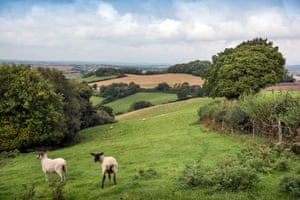
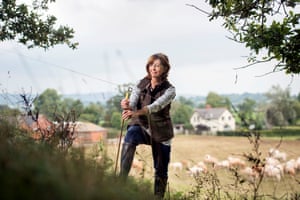
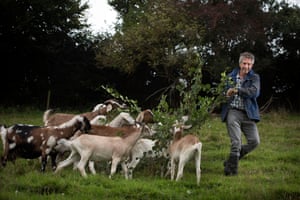
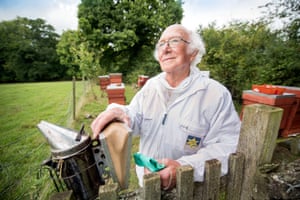
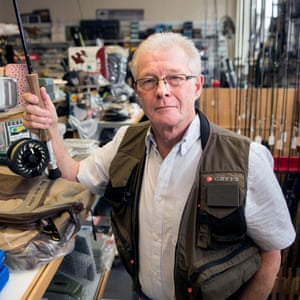
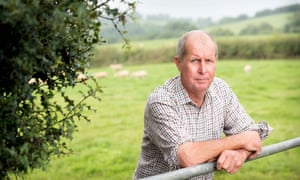
No comments:
Post a Comment